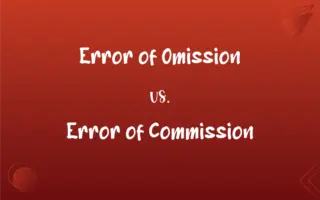Always vs. Forever: What's the Difference?
Edited by Harlon Moss || By Janet White || Published on November 19, 2023
"Always" denotes a consistent, unchanging condition, while "Forever" signifies an infinite duration of time.

Key Differences
"Always" is an adverb that describes an action or condition that remains consistent or unchanging across time. When someone says, "She always arrives on time," it signifies a habit or regularity, emphasizing consistency. "Always" can refer to the past, present, and future, but its primary function is to depict a consistent pattern or behavior over varying periods.
"Forever," on the other hand, primarily indicates an infinite, unending duration of time. It carries a sense of permanence and timelessness. When used in sentences like "They promised to be together forever," the word gives a sense of an endless time span, often with a touch of emotional depth. It encapsulates an idea of eternity and can be both literal, as in endless time, or figurative, portraying a deep emotion or commitment.
Interestingly, "Always" and "Forever" can sometimes be used interchangeably in casual contexts, especially when expressing sentiments or emotions. For instance, "I will always love you" and "I will love you forever" convey similar sentiments of enduring affection. Yet, there's a nuanced difference: "Always" leans more towards consistency, while "Forever" emphasizes endless duration.
Though both words describe duration, their application can greatly differ based on context. Recognizing "Always" as denoting consistent behavior and "Forever" as symbolizing infinite time or depth can aid in discerning which term is apt for the situation.
Comparison Chart
Primary Definition
At all times
For an infinite duration
ADVERTISEMENT
Context
Habit, regularity
Permanence, timelessness
Example Usage
"She always smiles."
"Stars shine forever."
Emphasis
Consistency
Endless time
Emotional Depth
Less often has emotional depth
Often conveys deep emotion or sentiment
Always and Forever Definitions
Always
On every occasion
He always forgets his keys.
ADVERTISEMENT
Forever
Signifying a deep commitment
They promised to love each other forever.
Always
At all times
She is always punctual.
Forever
For an endless time
The diamond will last forever.
Always
Without exception
It's always colder in the mountains.
Forever
Continuously
The journey seemed to go on forever.
Always
In any event
You can always try again tomorrow.
Forever
At all times, perpetually
The sun is forever shining somewhere.
Always
Habitually or regularly
She always drinks coffee in the morning.
Forever
For everlasting time; eternally
No one can live forever.
Always
At all times; invariably
Always late.
Forever
At all times; incessantly
Was forever complaining about the job.
Always
For all time; forever
They will always be friends.
Forever
A seemingly very long time
It has taken forever to resolve these problems.
Always
At any time; in any event
You can always resign if you're unhappy.
Forever
(duration) For all time, for all eternity; for a lifetime; for an infinite amount of time.
I shall love you forever.
Always
At all times; throughout all time; since the beginning.
God is always the same.
Green has always been my favorite color. I’ve loved it for as long as I can remember.
Airplanes did not always exist as a form of transportation.
Forever
For a very long time, a seeming eternity.
We had to wait forever to get inside.
That was forever ago.
Always
Constantly during a certain period, or regularly at stated intervals (opposed to sometimes or occasionally).
In this street, the shops always close during lunchtime.
Forever
(frequency) Constantly or frequently.
You are forever nagging me.
Always
(informal) In any event.
I thought I could always go back to work.
Forever
An extremely long time.
I haven't seen him in forever!
Always
At all times; ever; perpetually; throughout all time; continually; as, God is always the same.
Even in Heaven his [Mammon's] looks and thoughts.
Forever
(colloquial) A mythical time in the infinite future that will never come.
Sure, I'd be happy to meet with you on the 12th of forever.
Always
Constancy during a certain period, or regularly at stated intervals; invariably; uniformly; - opposed to sometimes or occasionally.
He always rides a black galloway.
Forever
Permanent, lasting; constant, perpetual.
Always
At all times; all the time and on every occasion;
I will always be there to help you
Always arrives on time
There is always some pollution in the air
Ever hoping to strike it rich
Ever busy
Forever
Through eternity; through endless ages; eternally.
Always
Seemingly without interruption; often and repeatedly;
Always looking for faults
It is always raining
He is forever cracking jokes
They are forever arguing
Forever
At all times; always.
Always
At any time or in any event;
You can always resign if you don't like it
You could always take a day off
Forever
For a limitless time;
No one can live forever
Brightly beams our Father's mercy from his lighthouse evermore
Always
Forever; throughout all time;
We will always be friends
I shall treasure it always
I will always love you
Forever
Seemingly without interruption; often and repeatedly;
Always looking for faults
It is always raining
He is forever cracking jokes
They are forever arguing
Forever
For a very long or seemingly endless time;
She took forever to write the paper
We had to wait forever and a day
Forever
Indicating a very long time (often exaggerated)
I've been waiting here forever!
FAQs
Does "Always" mean every single time?
Yes, it denotes consistency and regularity.
Does "Forever" often carry emotional weight?
Yes, it can convey deep sentiment or commitment.
Is "Always" more about pattern than duration?
Yes, it emphasizes consistent behavior.
Can "Forever" be used exaggeratively?
Yes, like "I've been waiting forever!"
Does "Forever" mean without an end?
Yes, it signifies an infinite duration.
Are "Always" and "Forever" sometimes interchangeable?
In casual contexts, especially in expressing emotions, they can be.
Can "Always" refer to habits?
Yes, like "She always exercises in the morning."
Can "Always" refer to the past?
Yes, as in "He's always been kind."
Is "Forever" commonly used in vows?
Yes, symbolizing lasting commitment.
Does "Always" usually require a verb?
Typically, as it's an adverb modifying an action.
Does "Forever" literally mean eternity?
Often, but it can also be used figuratively.
Can "Forever" denote a sense of hope?
Yes, such as "Hope burns forever."
Which word has a stronger emphasis on time's length?
"Forever" emphasizes an infinite or lengthy duration.
Can "Always" depict unchanging conditions?
Yes, like "The north pole is always cold."
Which word has a broader range of application?
"Always" has diverse uses from habits to unchanging conditions.
Is "Always" used in positive and negative contexts?
Yes, it can be neutral, like "always present" or negative like "always complaining."
Can "Forever" stand alone?
Yes, like in "This is taking forever."
Does "Always" have synonyms related to time?
Yes, like "constantly" or "perpetually."
Can "Forever" describe nature's phenomena?
Yes, like "Mountains stand forever."
Are both words commonly used in daily speech?
Yes, both are prevalent in conversations and written content.
About Author
Written by
Janet WhiteJanet White has been an esteemed writer and blogger for Difference Wiki. Holding a Master's degree in Science and Medical Journalism from the prestigious Boston University, she has consistently demonstrated her expertise and passion for her field. When she's not immersed in her work, Janet relishes her time exercising, delving into a good book, and cherishing moments with friends and family.
Edited by
Harlon MossHarlon is a seasoned quality moderator and accomplished content writer for Difference Wiki. An alumnus of the prestigious University of California, he earned his degree in Computer Science. Leveraging his academic background, Harlon brings a meticulous and informed perspective to his work, ensuring content accuracy and excellence.

































































